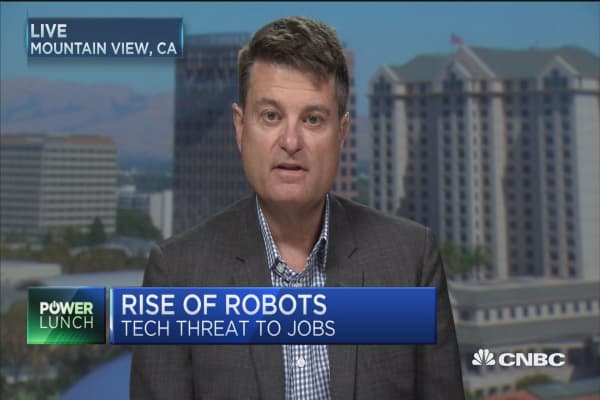Why only US! Automation will banish jobs in India & China too!!
[h=1]Automation Is the Greatest Threat to the American Worker, Not Outsourcing[/h]
[h=5]In Brief[/h]
[h=2]Unintended Consequences[/h]During his campaign, president-elect Donald Trump made a promise to keep jobs in Indiana. Now, he’s making good on that promise by brokering a deal with Carrier that ensures that the manufacturer would keep 1,000 jobs across two locations in Indiana. That victory might be short-lived, however, as the deal could create unintended consequences for the company’s employees in the future.
Carrier initially intended to relocate its plant to Mexico where costs would be lowered due to the country’s cheaper and more dedicated labor force. “Wages are obviously significantly lower. About 80% lower on average. But absenteeism runs about 1%. Turnover runs about 2%,” said Greg Hayes, the CEO of United Technologies (the parent company of Carrier), during an interview with CNBC’s “Mad Money.” The move would have resulted in the loss of about 1,400 jobs in Indiana.
As part of the deal brokered by the Trump administration, 850 jobs will remain in Indiana and United Technologies will be awarded $7 million in tax incentives. In the interview with “Mad Money,” Hayes revealed that United Technologies will be making a $16 million investment in the plant, but it’s what the CEO said is the ultimate goal of that investment that’s key: “…to automate to drive the cost down so that we can continue to be competitive.”
 Credit: Carrier[h=2]The Sting of Automation[/h]As Hayes elaborates in the interview, automating won’t be as cheap as moving to Mexico would be, but the result for many of the state’s workers will eventually be the same: “we will make that plant competitive just because we’ll make the capital investments there…But what that ultimately means is there will be fewer jobs.”
Credit: Carrier[h=2]The Sting of Automation[/h]As Hayes elaborates in the interview, automating won’t be as cheap as moving to Mexico would be, but the result for many of the state’s workers will eventually be the same: “we will make that plant competitive just because we’ll make the capital investments there…But what that ultimately means is there will be fewer jobs.”
While outsourcing used to be the most financially sensible choice for companies operating in countries with no labor cost advantage, that role has been taken over by automation. Companies like Nike have closed some of their factories in China in favor of automation, and they subsequently saw their profits rise (for Nike, by 16 percent during its 2013 fiscal year). This doesn’t bode well for low-skilled workers who depend on these jobs to live.
Industry experts and scientists have been warning us about the bleak outcome for the human labor force in the age of automation. Perhaps now is the time to stop focusing on the positive effects of automation and start figuring out how to mitigate the negative ones.
https://futurism.com/automation-is-the-greatest-threat-to-the-american-worker-not-outsourcing/
[h=1]Automation Is the Greatest Threat to the American Worker, Not Outsourcing[/h]
| Author Eleazer Corpuz |
| Editor Kristin Houser |
| December 8, 2016 |
- While president-elect Donald Trump's Carrier deal will keep some jobs in Indiana, United Technologies' plan to invest $16 million to automate the plant will ultimately lead to job loss.
- Job loss in inevitable in the age of automation, so we must find ways to mitigate the negative impact on the human labor force.
[h=2]Unintended Consequences[/h]During his campaign, president-elect Donald Trump made a promise to keep jobs in Indiana. Now, he’s making good on that promise by brokering a deal with Carrier that ensures that the manufacturer would keep 1,000 jobs across two locations in Indiana. That victory might be short-lived, however, as the deal could create unintended consequences for the company’s employees in the future.
Carrier initially intended to relocate its plant to Mexico where costs would be lowered due to the country’s cheaper and more dedicated labor force. “Wages are obviously significantly lower. About 80% lower on average. But absenteeism runs about 1%. Turnover runs about 2%,” said Greg Hayes, the CEO of United Technologies (the parent company of Carrier), during an interview with CNBC’s “Mad Money.” The move would have resulted in the loss of about 1,400 jobs in Indiana.
As part of the deal brokered by the Trump administration, 850 jobs will remain in Indiana and United Technologies will be awarded $7 million in tax incentives. In the interview with “Mad Money,” Hayes revealed that United Technologies will be making a $16 million investment in the plant, but it’s what the CEO said is the ultimate goal of that investment that’s key: “…to automate to drive the cost down so that we can continue to be competitive.”

While outsourcing used to be the most financially sensible choice for companies operating in countries with no labor cost advantage, that role has been taken over by automation. Companies like Nike have closed some of their factories in China in favor of automation, and they subsequently saw their profits rise (for Nike, by 16 percent during its 2013 fiscal year). This doesn’t bode well for low-skilled workers who depend on these jobs to live.
Industry experts and scientists have been warning us about the bleak outcome for the human labor force in the age of automation. Perhaps now is the time to stop focusing on the positive effects of automation and start figuring out how to mitigate the negative ones.
https://futurism.com/automation-is-the-greatest-threat-to-the-american-worker-not-outsourcing/

